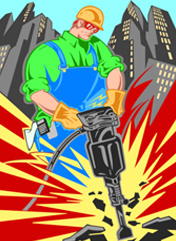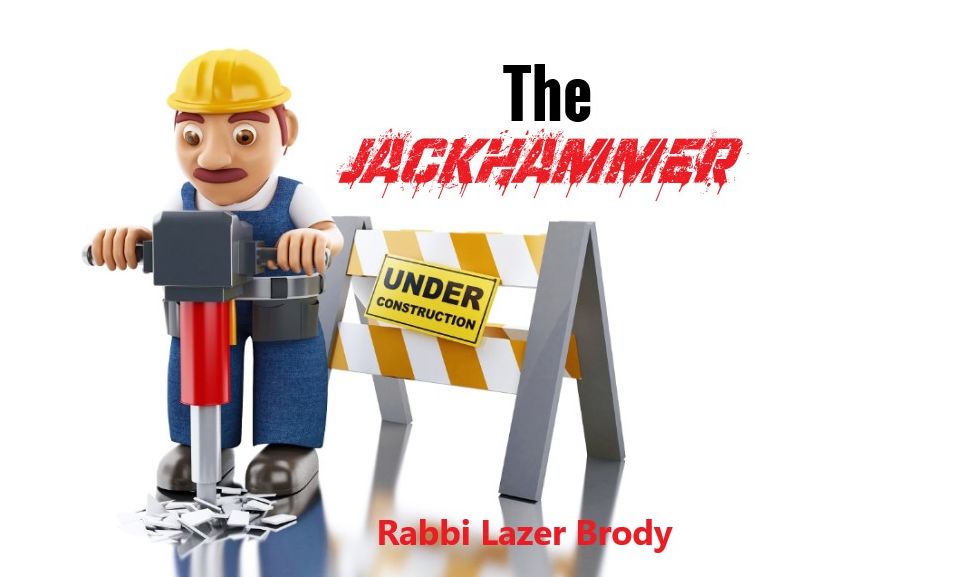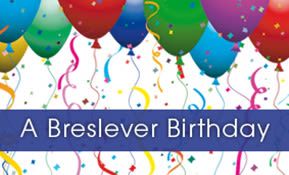We can smell Rosh Hashanah in the air, already…
Teshuva, to be effective, has 4 important steps: Stopping the bad behavior, Confession, Asking forgiveness, and Resolving not to repeat the transgressions; this is what I like to call the “SCAR” treatment because it erases scars from the soul. If one of these steps is faulty or missing, then the teshuva isn’t complete, our spiritual debts aren’t wiped clean, and our soul isn’t healed. The scar. That’s dangerous because unpaid spiritual debts invoke harsh judgments, for the Gemara says that there are no tribulations without prior transgressions.
Can we say that our teshuva is good enough to get us off the hook? Oftentimes, we try to do teshuva and our mind is already thinking about another transgression? What kind of remorse is that? When we ask Hashem’s forgiveness for our shady business deals or for our slander of other people, do we really mean it? How fast are we right back on the telephone talking more lashon hara or fast-talking a customer with things that deviate from the truth just to make another dollar? Is that teshuva?
Rebbe Nachman of Breslev told his pupils – who were tremendous tzaddikim in their own right – that if they did teshuva on their own their entire lives, they don’t have the power to correct even one transgression. Then Rebbe Nachman said, “But don’t worry, I’ll do teshuva for you.”
Are we really Baalei Teshuva? Are we really ashamed of our misdeeds to the point of embarrassment when we face Hashem? Rebbe Nachman told Rebbe Natan that true shame and remorse for a misdeed means that someone stands before Hashem in prayer and his cheeks burn from embarrassment. Can we say this about ourselves? If our cheeks don’t burn, then it’s a sign that we’re not really embarrassed by our sins. If one isn’t ashamed of oneself, then there’s no remorse. If there’s no remorse, there’s no teshuva.
The reason we don’t feel shame and embarrassment when standing before Hashem is because in this generation, we lack spiritual sensitivity, as if we had hearts of stone. Can you say that you care about a fellow human being? Do you care about the poor guy in shul that’s just been laid off his job? Did you care when 8,500 people lost their homes and their livelihood when they were expelled from Gush Katif? Do you care about a Jew in Sderot who’s home has just been wrecked by a Kassam missile? Can you really stand before Hashem and say that you’re truly sorry about your misdeeds? Many of us don’t even think we have anything to be sorry about. That’s a heart of stone.
Rebbe Nachman writes in Likutei Moharan, first section, Torah 141 that if a person truly merits to feel his sins, then that’s the sign that his heart is not clogged and impermeable, for as long as one’s heart is hermetically sealed like a two-foot thick steel-rod reinforced concrete, one can’t feel the pain of one’s sins.
 With a heart of reinforced concrete, who can do teshuva? If we can’t feel the pain and embarrassment of our own sins, how can we regret them? What good is teshuva without remorse? Teshuva without remorse is insincere – a mere lip service.
With a heart of reinforced concrete, who can do teshuva? If we can’t feel the pain and embarrassment of our own sins, how can we regret them? What good is teshuva without remorse? Teshuva without remorse is insincere – a mere lip service.
The true tzaddik is the jackhammer that can pierce and penetrate even a heart that’s as impermeable as the walls of a Sderot bomb shelter.
There’s a story if the first chapter of tractate Dmai in the Yerushalmi Talmud about Rebbe Pinchas ben Yair. He came to a village, and the villagers ran out to greet him, but they had a look of alarm in their faces. The cried, “Rebbe, Rebbe, the mice are eating up all of our grain!” Rebbe Pinchas ben Yair, who was the tzaddik of the generation and the father-in-law of Rebbe Shimon bar Yochai, commanded all the mice to appear before him. Soon, tens of thousands of mice emerged from the wheat fields and came into town, an entire army of little squeakers.
Rebbe Pinchas ben Yair turned to the villagers and asked, “Do you understand what the mice are saying?” The villagers of course understood nothing – all they heard was sea of squeaking. Rebbe Pinchas then told them, “The mice are eating your grain because you haven’t taken a tithe of the grain.” In other words, grain in Israel isn’t kosher unless we remove ten percent, known as a tithe in English, or maaser, in Hebrew. This tithe goes to the Levites who don’t have their own land as payment for their service in the Holy Temple.
The villagers then asked Rebbe Pinchas ben Yair if he would guarantee them that if they gave the tithe, the mice would disappear. He agreed. The villagers paid the tithe, and the mice surely disappeared.
Suppose that Rebbe Pinchas ben Yair would have visited the village without the villagers having suffered from the mice. Now suppose that he noticed with his far-seeing spiritual eyes that they weren’t removing the tithe from their grain as Torah requires. Imagine that the villagers had a harvest of 100 tons of grain. The tzaddik now tells them that they have to give away 10 tons of grain to the Levites in the Holy Temple. In today’s jargon, imagine what they’d say: “What, we broke our backs all year long in the hot sun raising our wheat, plowing, planting, cultivating, weeding, and harvesting – and now you expect us to give ten tons of our hard-earned grain to those loafers in Jerusalem? Let them go get a job…”
Yet, the villagers committed to giving their tithe right away. Why? When a person is in trouble, he or she is willing to commit to anything, the bigger the trouble the bigger the commitment. The mice would have eaten up all the grain. In this case, giving away the tithe was a bargain. Anyway, that’s not the key point of the story. The villagers didn’t think that they did anything wrong. Rebbe Pinchas ben Yair opened up their eyes. He not only identified their problem, but he personally arranged the solution. That’s the power of the tzaddik of the generation.
Fortunately, we too have a true tzaddik of this generation – his name is Rebbe Nachman of Breslev. Rebbe Nachman is also capable of identifying and solving our problems. He takes personal responsibility for our soul correction. Not only that, but he promises to do teshuva in our behalf. That doesn’t mean that we go fishing or on a tropical vacation. It means that we do everything the tzaddik tells us to – an hour of personal prayer every day, confessing our sins, expressing our remorse the best we can, asking for Hashem’s forgiveness and resolving to do better. Once we do our part, Rabbenu picks up the rest of the tab. He moves mountains for us in the Heavenly Court.


 With a heart of reinforced concrete, who can do teshuva? If we can’t feel the pain and embarrassment of our own sins, how can we regret them? What good is teshuva without remorse? Teshuva without remorse is insincere – a mere lip service.
With a heart of reinforced concrete, who can do teshuva? If we can’t feel the pain and embarrassment of our own sins, how can we regret them? What good is teshuva without remorse? Teshuva without remorse is insincere – a mere lip service.











Tell us what you think!
Thank you for your comment!
It will be published after approval by the Editor.